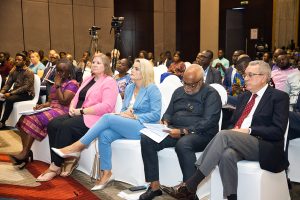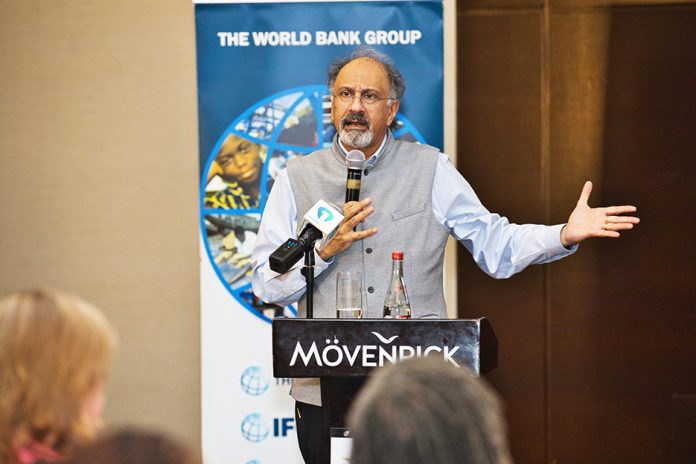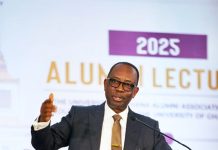The Chief Economist and Senior Vice President for Development Economies at the World Bank, Mr Indermit Gill has stated that Ghana’s growth has been positive but not sufficient.
Addressing the gathering at the launch of the 2024 World Development Report titled: “The Middle-Income Trap” in Accra, on October 10, 2024 Indermit Gill highlighted the need to increase the growth rate without over-reliance on external borrowing.
He recommended maintaining a public Debt-to-GDP ratio of not more than 50 percent to create a more favorable environment for growth.
He urged Ghana to expedite its economic growth whilst carefully managing public debt. He pointed out that despite being classified as a lower-middle-income country for over a decade Ghana’s growth rate has not kept pace with East Asian countries.
Mr. Gill stated that Ghana’s growth has been positive, but not sufficient, highlighting the need to increase the growth rate without over-reliance on external borrowing.
He recommended maintaining a public Debt-to-GDP ratio of no more than 50 percent to create a more favourable environment for growth.

Mr. Gill cited the successes of nations like South Korea and China which sustained high growth rates over decades, expressing confidence that Ghana, with its educated workforce and rich natural resources could achieve similar outcomes.
However, he stressed the importance of balancing public and private investment, emphasising that private sector involvement would be crucial for Ghana’s transition to a high-income economy. He also called for Ghana to leverage its Diaspora and deepen integration with global markets.
Despite the increasingly challenging global economic landscape, Mr. Gill affirmed that Ghana is well-positioned to improve its domestic conditions and achieve sustained growth.
The World Bank has launched its 2024 World Development Report titled: “The Middle-Income Trap” in Ghana, outlining key strategies for developing economies to avoid stagnation in the middle-income bracket.
The report asserts that lower-middle-income countries must transcend investment-driven models by adopting modern technologies and successful business practices from abroad.
Meanwhile, upper-middle-income nations are encouraged to enhance innovation and advance technological frontiers.
To achieve these goals, the report suggests reconfiguring economic structures related to enterprises, labor and energy, thereby fostering greater economic freedom, social mobility and political competition.
Dr. Maxwell Opoku-Afari, First Deputy Governor of the Bank of Ghana underscored the urgent need for strategic investments to drive structural transformation in Ghana’s economy.
He advocated for a more intentional investment approach, asserting that transforming the nation’s economic structure is vital for moving beyond its current middle-income status.
Dr. Opoku-Afari stated that the key issue for Ghana is about investment, emphasising the need for a targeted and transformative investment agenda.
He highlighted that economic growth should be built on solid, sustainable foundations rather than temporary fiscal measures.
His comments reflect a broader recognition of Ghana’s vulnerability to external shocks, illustrated by recent economic turmoil linked to global commodity price fluctuations and dependence on external financing.
Dr. Opoku-Afari also addressed the critical need for enhanced domestic revenue mobilisation. Despite ongoing tax reforms, Ghana’s revenue generation remains insufficient to support long-term growth.
“The quality of revenue mobilisation in Ghana is well below where it should be,” he explained, stressing the importance of broadening the tax base rather than intensifying collections from existing taxpayers.
“We should not continue to scrape the bottom. We need to expand the tax net and involve more people as part of the social contract necessary for structural transformation,” he added.
This approach, he suggested, would not only boost government revenues but also foster a sense of civic responsibility and shared commitment to national development.
He emphasised the importance of scrutinising public spending, arguing that the quality of expenditures is just as critical as revenue generation.
“How do we ensure that our spending is done more efficiently to develop this country?” he questioned.
Addressing these inefficiencies is crucial for Ghana if it hopes to meet its developmental goals while maintaining fiscal discipline.
According to Dr. Opoku-Afari, a core challenge facing Ghana is the lack of “infusion”—a term he used to describe investments that genuinely transform the domestic economy, particularly by nurturing local talent and capacity.
He contrasted this with South Korea’s rapid industrialisation, arguing that foreign investments in Ghana often fail to impart the skills and knowledge necessary for sustainable long-term growth.









